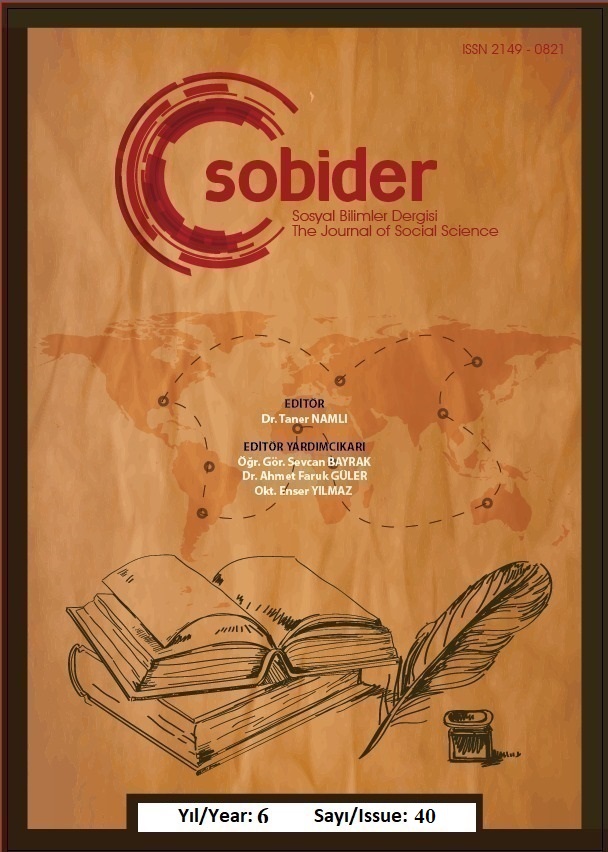Author :
Abstract
Şahıs haklardan faydalanabilen ve hak sahibi olabilen varlıktır. Şahsiyet (kişilik) ise onun haklardan istifade ehliyetini anlatır. Aile, ferdin bazı sosyal ve tabii ihtiyaçlarının karşılanması ve nesillerin kıyamete kadar âhenkle devamı için gerekli olan bir müessesedir. Nikâh akdi ile eşler arasında sıhrî akrabalık bağı kurulmuş olur. Nesep ile de aile fertleri kan birliği ve birbirinden olma temeli üzerinde yükselen daimi bir akraba¬lık bağı ile bağlanırlar. Nesep, şahısın anne, baba ve bunların vasıtasıyla diğer akrabaları arasındaki soy bağıdır. Neslin muhafazası?, İslâm’ın korunmasını ?hedeflediği değerleri ve faydaları? ifade eden zarûriyyâttandır. Zinan?ın kesin olarak yasaklanması ve soylar?ın karışmasına yol açacak düzenlemelere cevaz verilmemesi neslin insana yarışı??r biçimde korunabilmesi için alınan önlemlerin başında gelir. Bu bakımdan nesebin tespiti çok önemlidir. Şahsiyet ölümle birlikte sona erer ve evlilik birliği de kendiliğinden son bulur. Böylece ölenin eşi dul kişi olur. Hamile değil ise onun başkası ile evlenebilmesi için dört ay on gün iddet beklemesi gerekir. Kocasının vefatından sonra dul kalan bu eşten dünyaya gelen çocuğun nesebinin tespiti konusunda altı aylık süreye itibar edilir. Bu konuda tıp ilminden de faydalanılır. Bu makalede şahsiyetin sona ermesinin evlenme akdi ve nesebin tespitine etkisinin anlatılması hedeflenmektedir.
Keywords
Abstract
A person is an asset that can enjoy and be entitled to rights. Personality (person) refers to the license to benefit from the rights. The family is an institution that is necessary for the provision of certain social and natural needs of the individual and for the continuation of generations in harmony until the doomsday. The marriage will be established between the spousal relationship of kinship. The Genealogy and family members are connected with a permanent kinship that rises on the basis of blood unity and being from each other. Genealogy refers to the lineage between the mother, father and other relatives of the person. The preservation of the generation is an obligation that expresses the values and benefits that Islam aims to protect. The strict prohibition of prostitution and the failure to allow arrangements to lead to the confusion of the ancestors is one of the measures taken to protect the generation in a competitive manner. In this respect, the determination of the object is very important. Personality ends with death and marriage ends spontaneously. So the victim's wife becomes a widow. However, she waits four months and ten days for her to marry someone else. A six-month period is needed to determine the descendants of the child who was born from the widow after the husband's death. Medical science is used in this regard. In this article, it is aimed to explain the effect of the termination of personality on the marriage contract and the identification of the object.
Keywords
- Bâbertî, Ekmelüddîn Muhammed b. Mahmûd b. Ahmed el-Bâbertî er-Rûmî el-Mısrî (ö786/1384), el-‘İnâye şerhu’l-hidâye, I-VI, Daru’l-kütübü’l-ilmiyye, Beyrut 2007.
- Cevherî, Ebû Nasr İsmail b. Hammâd el-Cevherî, es-Sıhâh fi’l-luğa (thk. Ahmed Abdulgafûr), I-VI, Daru’l-melâyîn, Beyrut 1987.
- Çırak, Hasan Hayri, İslam Hukukunda Hükmi Şahsiyet, Doktora tezi (Basılmamış), Atatürk Üniversitesi Sosyal Bilimler Fakültesi, Erzurum 2001
- Dönmez, İbrahim Kafi, "Şahıs", DİA, XXXVIII, İstanbul 2010. _____ “Nesep”, DİA, XXXII, 573-575, İstanbul 2006.
- Esen, Hüseyin,"Ölüm", DİA, (XXXIV), 38-39, İstanbul 2007.
- Genç, Mustafa, “İslâm Hukukunda Ailenin Önemi ve Evlilik Hayatının Faydaları”, Sosyal Bilimler Dergisi, Yıl: 5, Sayı: 30, Kasım 2018, s. 272-294
- Heyet, (Jale G. Akipek, Turgut Akıntürk, Derya Ateş), Türk Medeni Hukuku Başlangıç Hükümleri Kişiler Hukuku, Yenilenmiş Baskı, 13. Baskı, 1, Beta Yayınları, İstanbul 2016.
- - el-Fetâvâyı el-Hindiyye fî Mezhebi’l-İmâmi’l-‘Azam Ebî Hanîfete’n-N‘umân, I-VI, Dâru’l-Fikir, Beyrut 1411/1991.
- İbn Âbidîn, Muhammed Emîn b. Ömer b. Abdilazîz el-Hüseynî ed-Dımeşkî (ö. 1252/1836), Hâşiyetu reddu'l-muhtâr ‘ale'd-durri'l- muhtâr şerhi tenviru'l-ebsâr, I-VI, Mektebetü ve Matbaatü Mustafa el-Babî el-Halebî, Kahire 1386/1966.
- İbn Manzûr, Ebü’l-Fazl Cemâlüddîn Muhammed b. Mükerrem b. Alî b. Ahmed el-Ensârî er- Rüveyfiî (ö. 711/1311), Lisânü'l-‘Arab, I-XV, Dâru sâdır, Beyrut 1992.
- Kahveci, Nuri, “Hukuk Kavramı”, İslam Hukuk Başlangıcı, Hikmet evi, İstanbul 2018, 42.
- Karaman, Hayreddin, Mukayeseli İslam Hukuku, 9. Baskı I-III, İz Yayıncılık, İstanbul 2014.
- Kâsânî, Alâüddîn Ebu Bekr b. Mes‘ûd b. Ahmed el-Kâsânî (ö. 587/1191), Bedâi‘u’s-sanâi‘ fî tertîbi’ş-şerâi‘, l-X, Darü'l-Kütübu'l-İlmiyye, Beyrût 1418/1997.
- Muhammed Kadri Paşa (ö.1306/1888), el-Fevaid'l-aliyyeala'l-ahkami'ş-şeriyye fi'l-ahvali'ş- şahsiyye, Mektebetü Arfeh, Dımaşk 1420/1999.
- Özsunay, Ergün, Gerçek Kişilerin Hukuku Durumu, İstanbul Üniversitesi Yayınları, İstanbul 1979.
- Semerkandî, Alâeddîn (h. 539), Tuhfetu’l-fukahâ, Darü'l-kütübu'l-ilmiyye, Beyrût 1405/1984.
- Serahsî, Şemsuleimme Muhammed b. Ahmed es-Serahsî (ö.483/1090), el-Mebsût, I-XXX, Dâru’l-maʿrife, Beyrût 1414/1993 (el-Mebsût).
- Şeyhizâde, Abdurrahman b. Muhammed b. Süleyman Gelibolulu (ö. 1078/1667), Mecmaʿu’l- enhur fî şerhi Mülteka’l-ebhur (thk. Halil Ümrân el-Mansûr ), I-IV, Dâru’l-kütübü’lilmiyye, Beyrut 1419/1998.
